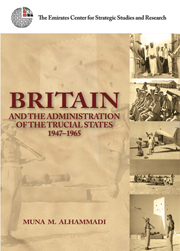Book contents
- Frontmatter
- Contents
- Abbreviations and Acronyms
- Preface
- Introduction
- 1 British Administration in the Trucial States before 1965
- 2 The Trucial Oman Levies and Scouts, 1951–1965
- 3 The Trucial States Council, 1952–1965
- 4 The British Role in the Development of the Trucial States before 1965
- Conclusion
- Notes
- Bibliography
- About the Author
- Index
Conclusion
Published online by Cambridge University Press: 05 September 2014
- Frontmatter
- Contents
- Abbreviations and Acronyms
- Preface
- Introduction
- 1 British Administration in the Trucial States before 1965
- 2 The Trucial Oman Levies and Scouts, 1951–1965
- 3 The Trucial States Council, 1952–1965
- 4 The British Role in the Development of the Trucial States before 1965
- Conclusion
- Notes
- Bibliography
- About the Author
- Index
Summary
Britain was able to maintain its presence in the emirates for a century and half by means of the administrative system it had established in the Gulf. This system was supervised by its government in India until 1947, depending on a group of employees headed by the Political Resident in the Gulf, who was followed in rank by the Political Agents in Muscat, Kuwait and Bahrain. In the emirates a Native Agent was appointed, who was lower on the diplomatic scale than the Political Agent. He represented the essential and sole conduit for communication between the Sheikhs of the region and Britain, until a Political Officer was appointed in Sharjah prior to the outbreak of the Second World War. The authority of the Political Officer was gradually expanded while those of the Native Agent decreased until the position was finally abolished in 1949.
The qualitative shift in the British administration of the emirates occurred in 1947, when the responsibility for supervising Gulf affairs was transferred from the British government of India to the Foreign Office in London. A number of regional and global changes occurred at this time; Britain emerged from the Second World War much weakened, while the importance of the Gulf region began to increase as US and Soviet ambitions grew in relation to procuring oil following discoveries in Bahrain, Saudi Arabia and Kuwait. Hence, Britain feared that its influence over the emirates might be curtailed by these developments.
- Type
- Chapter
- Information
- Britain and the Administration of the Trucial States (1947–1965) , pp. 141 - 146Publisher: Emirates Center for Strategic Studies and ResearchPrint publication year: 2013



